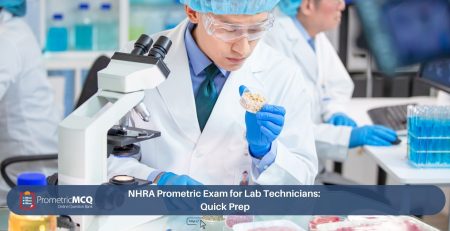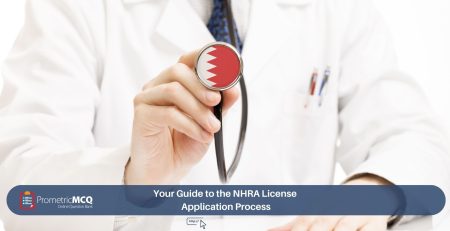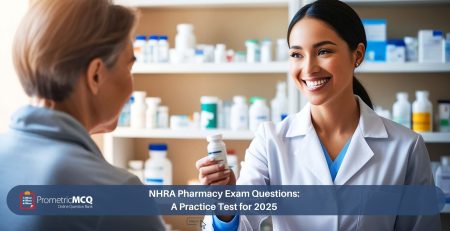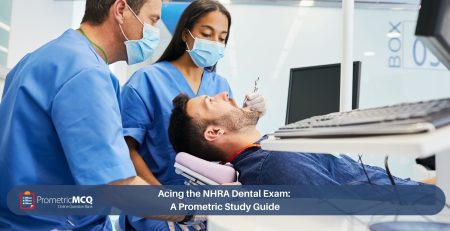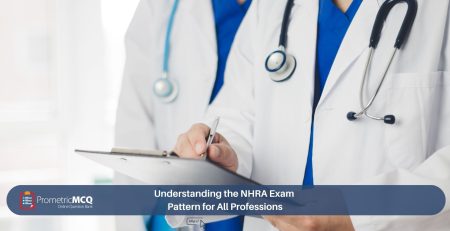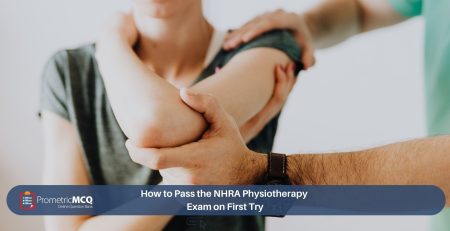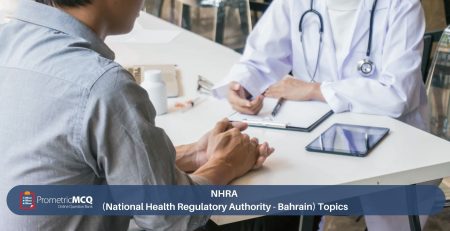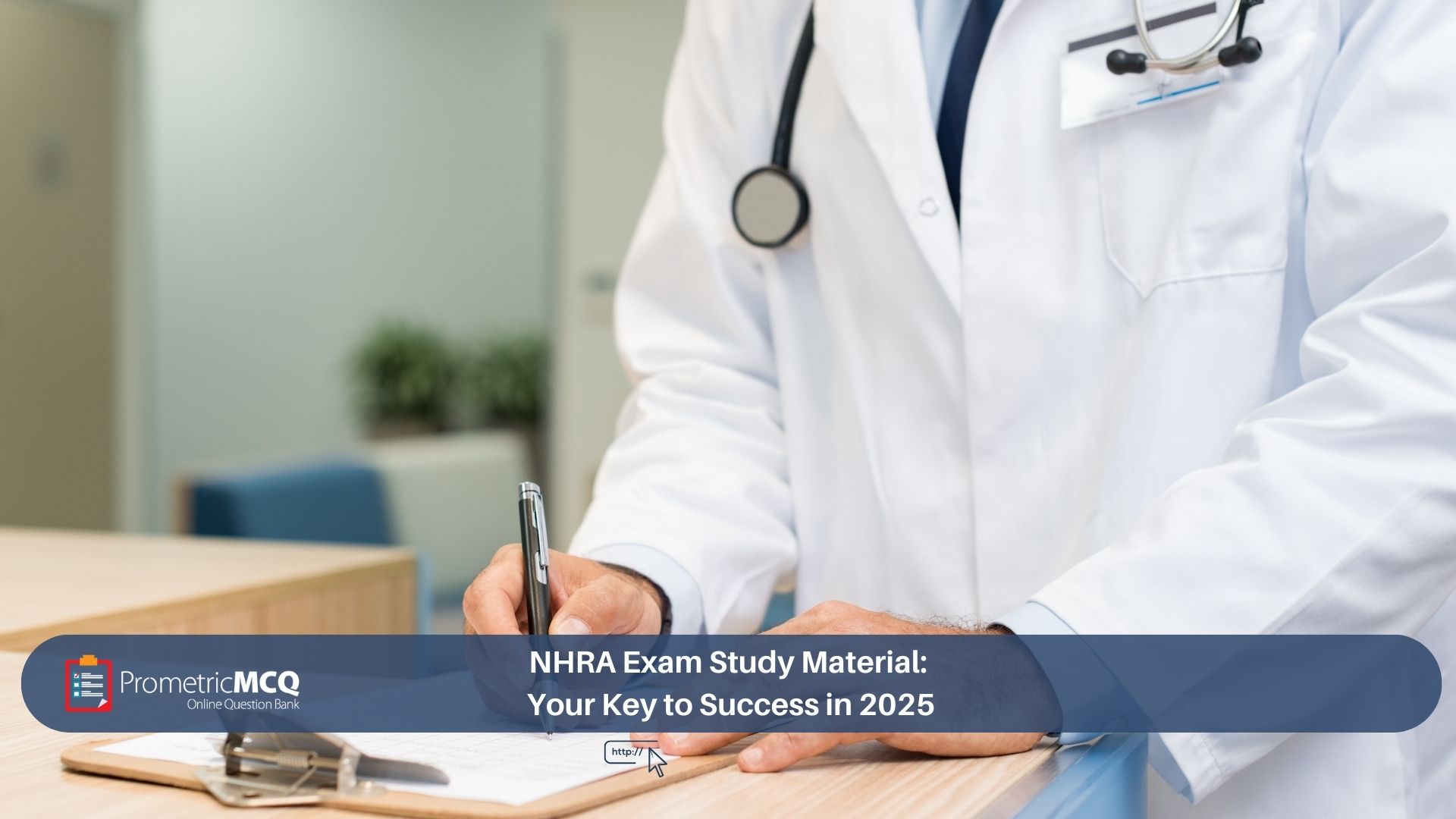
NHRA Exam Study Material: Your Key to Success in 2025
fatima@prometricmcq.com2025-09-18T19:36:55+00:00Table of Contents
ToggleNHRA Exam Study Material: Your Key to Success in 2025
Embarking on the journey to secure a healthcare license in the Kingdom of Bahrain is a significant professional undertaking. The National Health Regulatory Authority (NHRA) exam stands as a crucial checkpoint, a comprehensive test of your clinical knowledge and practical skills. In the face of such a high-stakes assessment, the quality and relevance of your study material are not just important—they are the single most critical determinant of your success. The right resources can transform your preparation from a daunting task into a structured, confident path to passing.
The internet is awash with a dizzying array of books, apps, and question banks, making it difficult to discern what is truly effective from what is simply noise. A successful candidate does not study harder; they study smarter. This involves creating a strategic arsenal of study materials that includes foundational textbooks for deep understanding, dynamic question banks for active learning, and up-to-date guidelines to ensure clinical currency. It’s about building a multi-layered learning system that prepares you for the clinical-reasoning-based nature of the NHRA exam.
This ultimate 2025 guide is designed to be your definitive manual for selecting the most effective NHRA exam study materials. We will navigate the landscape of available resources, providing expert recommendations for every major healthcare profession—from doctors and nurses to pharmacists and allied health specialists. We’ll delve into the what, why, and how of using each type of material, and cap it off with a comprehensive 10-point FAQ to clarify your every doubt. This is your key to unlocking a successful preparation strategy.
Key Takeaways on Choosing Study Material
- Question Banks (QBanks) are King: For active learning and exam simulation, a high-quality MCQ QBank is the single most important investment in your preparation.
- Textbooks Build the Foundation: Use standard, internationally recognized textbooks to build a deep, conceptual understanding of your core subjects.
- Don’t Neglect Official Sources: The official NHRA website is your primary source for Bahrain-specific laws and regulations, a critical component of the exam.
- Create a Multi-Layered Approach: The most successful strategy combines textbooks for knowledge, QBanks for practice, and clinical guidelines for currency.
- Quality Over Quantity: It’s better to thoroughly master one or two high-quality resources than to skim through a dozen mediocre ones.
The Foundational Layer: Core Textbooks by Profession
While modern preparation is heavily digital, the value of a core textbook cannot be overstated. Textbooks provide the in-depth, foundational knowledge and context that question banks often assume you already have. They are your primary reference for clarifying complex topics and building a solid base of understanding. Below are the gold-standard recommendations for each profession.
| Profession | Recommended Core Textbooks & Resources |
|---|---|
| Doctors (GP) | – Harrison’s Principles of Internal Medicine: The definitive text for internal medicine. – Kumar & Clark’s Clinical Medicine: Known for its clear, concise, and comprehensive coverage. – Oxford Handbook of Clinical Medicine: An excellent quick-reference guide. |
| Nurses | – Saunders Comprehensive Review for the NCLEX-RN: While for the US exam, its content review is universally excellent for nursing fundamentals and med-surg. – Lewis’s Medical-Surgical Nursing: The gold standard for in-depth understanding of disease processes and nursing care. |
| Dentists | – Neville’s Oral and Maxillofacial Pathology: Essential for the oral pathology component. – Shillingburg’s Fundamentals of Fixed Prosthodontics: The go-to text for crowns, bridges, and materials. – Cohen’s Pathways of the Pulp: The bible of endodontics. |
| Pharmacists | – DiPiro’s Pharmacotherapy: A Pathophysiologic Approach: The cornerstone for clinical pharmacy and therapeutics. – Goodman & Gilman’s The Pharmacological Basis of Therapeutics: For deep dives into pharmacology and MOA. – APhA’s Complete Review for Pharmacy: A comprehensive review book covering all major topics. |
| Physiotherapists | – Magee’s Orthopedic Physical Assessment: The definitive guide for all musculoskeletal special tests. – O’Sullivan’s Physical Rehabilitation: A comprehensive text for neurological and general rehabilitation. |
| Lab Technicians | – Henry’s Clinical Diagnosis and Management by Laboratory Methods: The most comprehensive reference for clinical pathology. – Bailey & Scott’s Diagnostic Microbiology: The essential text for the microbiology section. |
| Radiographers | – Bushong’s Radiologic Science for Technologists: Covers the physics, biology, and protection aspects that are crucial for the exam. |
The Active Learning Engine: The Power of Question Banks (QBanks)
If textbooks are the foundation, then Question Banks (QBanks) are the engine that drives your preparation forward. No other study tool is more effective at preparing you for the reality of the NHRA exam. They bridge the gap between knowing the material and being able to apply it under pressure.
Why QBanks are Non-Negotiable:
- Active Recall: Answering questions forces your brain to actively retrieve information, which is a far more effective learning method than passive reading.
- Pattern Recognition: You start to recognize how concepts are commonly tested, the clues in a question stem, and the patterns in both correct and incorrect answer choices.
- Simulates the Real Exam: Practicing in a timed, computer-based format builds the mental stamina and time-management skills essential for exam day.
- Identifies Weaknesses: Performance analytics in good QBanks show you exactly which topics you are struggling with, allowing you to focus your study time efficiently.
What to Look for in a High-Quality QBank:
Not all QBanks are created equal. Your chosen platform should be a core part of your Bahrain NHRA exam preparation strategy. Look for:
- A Large, Relevant Question Pool: Thousands of questions that are specific to your profession and at the right level of difficulty.
- Detailed, Evidence-Based Rationales: The explanation is more important than the question itself. It should clearly explain why the correct answer is right and why the other options are wrong.
- Multiple Modes: The ability to practice in both “Tutor Mode” (seeing the answer immediately) and “Timed Mode” (simulating a real exam block).
- Performance Analytics: The ability to track your scores over time and see your performance by subject area.
Staying Current: Essential Guidelines and Digital Resources
Medicine is constantly evolving, and licensing exams reflect the latest evidence-based practices. Relying solely on textbooks, which can be several years old, is a mistake. You must supplement your core learning with current resources.
Key Digital & Official Resources:
- The Official NHRA Website: This is your primary, non-negotiable source for anything related to Bahrain-specific regulations. For pharmacists, this is where you’ll find rules on controlled substances. For all professions, it has circulars and standards you must be aware of. You can find it at the official NHRA portal.
- International Clinical Guidelines: Familiarize yourself with the major guidelines relevant to your field. For example, doctors should know the latest AHA/ACC guidelines for cardiology, while nurses should be familiar with WHO patient safety goals.
- Reputable Medical Apps: Apps like Medscape and UpToDate are excellent for quickly looking up the latest treatment protocols and drug information.
Frequently Asked Questions (FAQs) on NHRA Study Materials
While a high-quality QBank is the single most important tool, it’s not recommended to use it in isolation. QBanks are most effective when used to test and apply the foundational knowledge you build from core textbooks and other learning resources. The ideal strategy is to use both in tandem: read a chapter in a textbook, then do a block of questions on that topic.
For rapidly changing fields like cardiology or infectious diseases, it’s best to use a textbook published within the last 3-5 years. For more stable subjects like anatomy or basic physiology, older editions are often acceptable. However, always supplement textbook knowledge with the latest clinical guidelines.
You should be extremely cautious. While some free resources can be helpful, many contain outdated information, incorrect answers, or questions that do not reflect the style and complexity of the actual NHRA exam. Your best investment is in a professionally curated, high-quality QBank. Relying on unverified “exam dumps” is a high-risk strategy.
University exams often test your ability to recall a broad range of information (rote memorization). The NHRA exam, however, tests your ability to *apply* that information to make safe and effective clinical decisions. Your study materials should reflect this; focus less on memorizing lists and more on understanding concepts and working through clinical scenarios.
There is no magic number, but a common target among successful candidates is to complete at least 2,000 to 3,000 high-quality practice questions. The key is not just the quantity, but the quality of your review. You should spend significant time understanding the rationale for every question you attempt.
The NHRA does not publish or endorse any specific textbooks or question banks. They provide a general syllabus or “exam blueprint” which outlines the topics that will be covered. Your responsibility is to find high-quality, third-party resources that align with this official blueprint.
If you are taking a specialist exam (e.g., Cardiology, Orthopedics), you need to go beyond generalist textbooks. Look for specialty-specific review books and question banks. Often, the best resources are those designed for major international board exams in that specialty (e.g., the American Board of Internal Medicine materials for a cardiologist).
This is a matter of personal preference. Digital textbooks (e-books) offer searchability and portability, which can be very efficient. Physical books can be easier on the eyes for long study sessions and don’t require a device. Many students find a combination of both to be the most effective approach.
Dedicate a specific portion of your study plan (e.g., one hour every Sunday) exclusively to this. Use the official NHRA website as your primary source. Make summary notes of the key regulations, especially those related to prescribing, patient consent, and confidentiality. Do not leave this topic for the last minute.
The final week is not for learning new material. Your best resources are your own summary notes, flashcards of key facts (e.g., drug doses, lab values), and one or two full-length mock exams to simulate the test day experience and timing. Your goal is to consolidate knowledge and build confidence. You can find a range of resources for this final push in the MCQs Packages section.
Conclusion: Building Your Arsenal for Success
Passing the NHRA exam is a direct result of the quality and strategic use of your study materials. There is no single “magic bullet” resource. Success is built on a robust, multi-layered foundation: core textbooks for deep knowledge, a high-quality QBank for active learning and application, and current guidelines for clinical relevance. By investing in the right tools and dedicating yourself to a structured study plan, you are not just preparing to pass a test; you are preparing to be a competent, confident, and successful healthcare professional in the Kingdom of Bahrain. Choose your materials wisely, and you will have laid the cornerstone for your success.
Ready to Transform Your Study with the Right Material?
Our comprehensive MCQ packages are the key to your success. Tailored for every healthcare profession, they provide thousands of high-yield questions, detailed clinical rationales, and simulated exams to ensure you are fully prepared.

